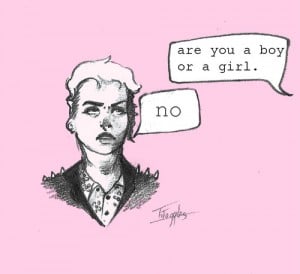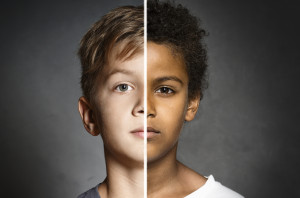Editor’s Note: This article is about how we should stop stigmatizing women for having body hair. It is NOT about shaming women for removing their body hair. We want women to be able to freely choose to keep or remove their body hair without facing social pressure to get rid of it.
Humans have been removing body hair since before we were even technically humans, but it wasn’t until 1915 when an ad featuring a woman with hairless armpits appeared in Harper’s Bazaar that the trend really picked up.
And for such a recent addition to the list of American beauty standards for women, it’s managed to become one of the most pervasive.
Early Embarrassments
There were two Cindys in my fourth grade class, but Cindy K. was the popular one. So when she teased me about having hairy legs, I was utterly humiliated. Truth be told, I had already suspected that my leg hair was shameful, and her taunts just confirmed my fears.
So I went home and begged my mom to let me shave. Unsurprisingly, she said no.
Her views on body hair were also a product of her upbringing as the child of German Jewish immigrants who didn’t understand why American women were so worried about this aspect of grooming. That perspective was then reinforced by my mom’s own second wave feminism.
As a result, she didn’t shave consistently (something that utterly mortified me growing up), and she also didn’t see why I at nine, or later 19, or even 29, should bother wasting so much time doing so either.
But as a kid, I knew exactly why this would be time well spent! It was the teasing from popular Cindy, and the anxiety over failing the stubble test (when middle school boys would furtively swipe at the space where sock and pant leg failed to meet to see if their female classmates’ legs were smooth).
It was the stream of bawdy jokes about hairy women on TV. And it was the obvious lack of hair sported by any woman in the public eye.
Shaving was simply the only acceptable option I could imagine.
Whether it’s social pressure, a barrage of ads for hair removal products, or things like PETA’s awful “Fur Trim Unattractive” campaign (which seems to equates having pubic hair with supporting the fur trade?!), many women and girls grow up believing that body hair is unattractive and gross and should be removed from as many places as humanly possible at the first sign of its existence.
And regardless of whether you shave or not, this stigma is only causing harm. Here’s how.
1. It Sets a Narrow Precedent for Our Daughters
These days, I am the mother of an 8-year-old daughter, and I worry about the impact of my behavior on her.
So I try to downplay the fact that I shave my legs and tell her how pretty her leg hair is. And just as I do in the health classes I teach, I remind her that some people remove body hair and others don’t, that some girls have lots of hair (yes, on their faces, too), and others very little.
My cousin’s wife Heather has taken that message even further.
Like so many of us, she was teased as a kid. In her case, it was about having underarm hair in middle school. But rather than trying to protect her daughter from the same fate by handing her a razor at the first hint of fuzz, Heather stopped shaving.
As she says, “I’ve gone through waves of shaving and not shaving, but when I started seeing armpit hair on my daughter at age eight (early, but not out of the bell curve), I knew she was too young to shave. I wanted her to have the message that hair is natural and acceptable. Generally, body image is a perception of others and what you are comfortable with, so I wanted to role model being comfortable with body hair.”
This is a message she feels can’t only be women’s to promote. “This isn’t, and shouldn’t be, just a mother-daughter conversation. I have a [male] partner who is actively engaged in discussing body image with his daughters.”
2. It Plays into the Gender Binary (And the Violence That Comes with It)
Today, body hair is such a public and visible identifier of a person’s gender that even the hint of it in unexpected places, or the lack of it where it is assumed to grow, can affect how feminine or how masculine someone is perceived to be. Indeed, being hair-free is often seen as a sign of cisgender heterosexuality in women.
And while all women get policed on this issue, for transwomen, the presence of body hair can not only be fraught, but also dangerous, since its detection can be used as “proof” that a transwoman is somehow less-than.
As blogger Tori writes on her site, Passing and Failing in Paradise, “My beard shadow and my voice…tend to get me clocked [identified as trans] by people who do not know me. This is sometimes frightening. People I do not know tend to be polite or awesome…but sometimes, strangers see my very existence as a crime against their own understanding of the way the world as they know it is supposed to work.”
To many people, a woman who doesn’t conform to certain presumptions about female appearance (say a cisgender woman who doesn’t remove her body hair or a transgender woman who does), is not seen as making a personal choice.
Rather, it is assumed that they have somehow failed to comprehend basic expectations of public presentation. If not that, they are thought to be making a hostile political statement.
3. It’s Not Just for Lesbians
Not surprisingly, lesbian and bisexual women often have slightly different experiences with body hair than do hetero-cisgender women or trans women. While the unshaven lesbian stereotype sure doesn’t hold for a lot of queer women, many do feel freer to leave their body hair as is than do a lot of straight women.
For example, Jenny, a queer woman in her thirties, has found that for the past fifteen years, leaving her hair alone is just the most natural option.
She explains, “I vaguely remember shaving in high school, but stopped when I discovered feminism in college. At the time, not shaving felt like telling the patriarchy to get off my body. But then later it just turned into a habit.
“As a side benefit, since I can easily pass as a straight woman, it’s nice to be at least a little visibly queer. Weirdly, the only person who has ever said anything to me about it is my seven-year-old niece, who recently lifted up my arm, and said, ‘You have hair in your armpit. Cool.'”
But Jenny also knows that her experience isn’t necessarily the norm. “I realize that I’m incredibly lucky to live in a community where being identifiably queer is not generally dangerous,” she says.
4. It Contributes to Othering
It’s not surprising that in a world where women’s body hair is seen as almost socially inexcusable, its absence also becomes a class marker like “good” teeth, clear skin, or a certain style of dress.
It follows then that its presence, for both working class women and women of color, can further position them as other.
This phenomenon was highlighted in an experiment conducted by Arizona State University professor Breanne Fahs in which she asked female students in her class to stop shaving their legs and underarms for ten weeks.
Some of the results of the experiment are what you’d expect. A lot of the women said they were disgusted with their own bodies, and a significant number reported feeling ”dirty.” Many of the participants were also subjected to homophobia and anger from family members and partners.
But what was particularly noteworthy was that certain women experienced these harsh reactions more intensely than others.
As Fahs writes in a June 2014 article published in Psychology of Women Quarterly, “Reactions to body hair carried raced and classed elements, as women of color and/or working-class women reported more familial regulation about body hair and far more social penalties for growing out their hair than did white or middle/upper class women. Women of color often expressed that body hair exacerbated their ‘differentness’ from white or middle/upper-class women in the course.”
Once again, we see how when people are already marginalized for their race or class, the possibility of being even further marginalized by any action that deviates from the norm is an ever-present risk.
What We Can Do
The casual disgust so many people express about women’s body hair often goes unchecked. It’s time to address that.
Here are a few ways how:
1. Change the Way We Talk About Growing Up
When we talk about puberty and body changes, be sure to mention that boys and girls both develop more hair on their legs, arms, faces, stomachs, chests, and around the genitals. There is no need to differentiate between the places males and females can get hair.
Additionally, present body hair removal as an option for girls, not a requirement.
Moms who shave may want to think about the message they are sending their daughters. This doesn’t mean you need to change your whole aesthetic, but figure out a way to address the issue thoughtfully.
2. Question Popular Culture
If popular culture is to be believed, the proper response to a woman’s body hair is either horror or humor. As a result, jokes about women with body hair abound.
Very occasionally, they get it right (think Liz Lemon finally revealing her Tom Selleck ‘stach on 30 Rock). But usually they don’t (think just about every other sitcom ever).
So at the risk of being called a humorless feminist, I say it’s time to question how funny these tropes actually are.
3. Try Growing Some
If you have never let your body hair grow out, take up Professor Fahs’ challenge to grow it out and see how things go.
Maybe you’ll be fine with (or even prefer) body hair if given the chance to actually get up close and personal with some.
4. Educate Yourself
There are myriad reasons why women don’t shave.
Plenty of women live in communities where shaving isn’t expected or seen as the most attractive options. Some women have medical conditions that make hair removal prohibitive.
Others refrain from removing hair for cultural or religious reasons.
For example, college student Balpreet Kaur made the news after someone secretly took a picture of her in the airport and posted it on Reddit’s r/funny thread — the “funny” thing being that Kaur is a woman with significant facial hair.
Kaur is also a practicing Sikh who does not cut her hair for religious reasons and one who responded to the taunt with the utmost grace. As she wrote on Reddit, “Yes, I’m a baptized Sikh woman with facial hair. Yes, I realize that my gender is often confused and I look different than most women. However, baptized Sikhs believe in the sacredness of this body.”
There are teens who desperately want to shave but whose parents, often for religious or cultural reasons and sometimes just because they think a girl is too young, forbid them from doing so.
And some women don’t shave because they find the standard to be arbitrary and simply prefer not to.
Understanding why some women choose not to shave can help you to put body-hair-shaming into context and understand why it isn’t a fair judgment to make.
In Soli-hair-ity
Look, it’s not like if you shave, the only solution to combating the negative associations with women’s body hair is to dump the wax, toss your razors, and delete that laser hair removal Groupon you’ve been saving.
But if you have ever winced at the sight of a woman’s hairy legs, unshaven armpits, or even the hint of a mustache, it’s time to ask yourself just what about it you find so offensive. Or why it makes you so uncomfortable. Or what aspect seems unattractive — and why.
This isn’t an us-versus-them issue, but the fact that women who choose to shave often contribute — even unwittingly — to the stigmatization of women who don’t is something we can definitely work on changing.
[do_widget id=”text-101″]
Ellen Kate is a Contributing Writer at Everyday Feminism. Originally from Canada, she is a health educator (and mom) based in New York City, where she teaches high school and college classes, and runs About.com’s LGBT Teens website. Find more of her writing here and follow her on Twitter @ellenkatef.
Search our 3000+ articles!
Read our articles about:
Our online racial justice training
Used by hundreds of universities, non-profits, and businesses.
Click to learn more





















